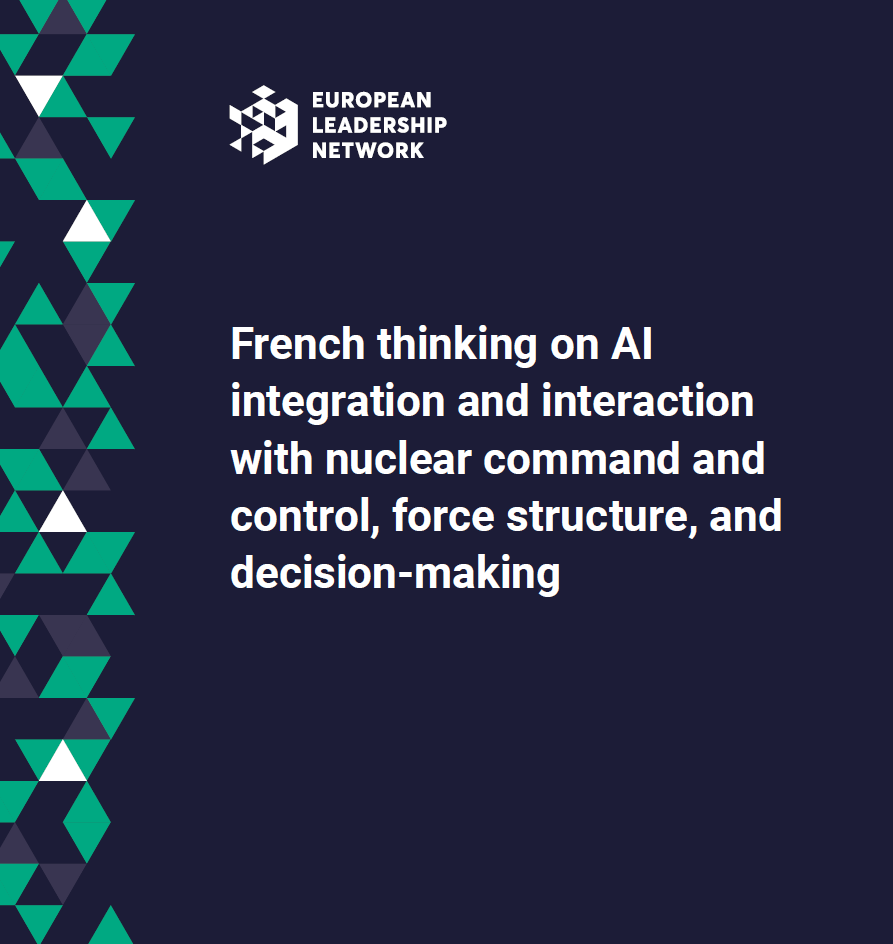French thinking on AI integration and interaction with nuclear command and control, force structure, and decision-making

This paper analyses the French literature on France’s perception of military AI, especially its consequences on strategic systems and competition, and nuclear deterrence.
It draws on official strategies, doctrines, and speeches, reports and studies written by French scholars, and articles written by former or active military officers during their higher military education.
The paper gives a brief overview of the French approach to the debate, followed by the official positions on the development of military AI. It then focuses on the impact of AI on C2 and decision systems, including NC3 and its consequences on strategic stability. It concludes with a short overview of how France understands military AI programs from the P5 countries.
The paper recommends that, both on a domestic and international level, France should:
- Build a stronger community of researchers, officials and the private sector on AI and its impact on nuclear deterrence. Even though some initiatives such as the Réseau Nucléaire & Stratégie aim at creating a new generation of strategists and researchers on nuclear policy and industry, it could be interesting to fund additional scholarships, to create a chair on these topics in academia, or to support a seminar on this subject.
- Strengthen the links between the public and the private sectors. Misunderstanding about AI can fuel wrong analyses about its impact on military and nuclear strategy. Getting together data scientists and computer scientists with IR specialists and nuclear experts could be helpful.
- Support a P5 initiative on AI and risks related to the NC3. The P5 process on Strategic Risk Reduction, including the Youth Group, could be a good arena to push for these topics. A statement about the necessity to keep humans in the loop and to introduce strong means of crisis communication in order to avoid inadvertent escalation could be a good initiative.

Available in:
Regions and themes
Share
Download the full analysis
This page contains only a summary of our work. If you would like to have access to all the information from our research on the subject, you can download the full version in PDF format.
French thinking on AI integration and interaction with nuclear command and control, force structure, and decision-making
Related centers and programs
Discover our other research centers and programsFind out more
Discover all our analysesMapping the MilTech War: Eight Lessons from Ukraine’s Battlefield
This report maps out the evolution of key technologies that have emerged or developed in the last 4 years of the war in Ukraine. Its goal is to derive the lessons the North Atlantic Treaty Organization (NATO) could learn to strengthen its defensive capabilities and prepare for modern war, which is large-scale and conventional in nature.
"Iron Swords" A Military Analysis of Israel's War in Gaza
On October 7, 2023, Hamas' attack, dubbed “Al-Aqsa Flood,” caused a major shock and led Israel to launch the longest war in its history. Operation “Iron Swords” was notable for its unprecedented intensity, both in terms of the massive ground forces deployed and the firepower used.
Saudi Arabia’s Nuclear Temptations. Lessons Learned from Regional Instability
Saudi Arabia’s integration in the international arena and regional stability, notably through reducing its dependence on fossil energies, are crucial elements for the success of the Kingdom’s Vision 2030, the Crown Prince’s top priority. However, Mohammed bin Salman’s declarations in 2018 and 2021, indicating that “if Iran develops a nuclear bomb, we will follow suit as soon as possible”, combined with the recent strikes on key Iranian nuclear facilities, do not bode well for the future of the Kingdom, the region and the non-proliferation regime at large.
The Future of Air Superiority. Command of the Air in High Intensity Warfare
Air superiority, understood as control of the air, is a cornerstone of the Western art of warfare. It is a decisive condition, albeit not sufficient by itself, to achieve military victory, as it enables the concentration of air power toward the achievement of wider strategic objectives and protects other components from unbearable attrition levels. It is best achieved through the offensive use of air power in a joint effort to neutralize the enemy’s air power.












